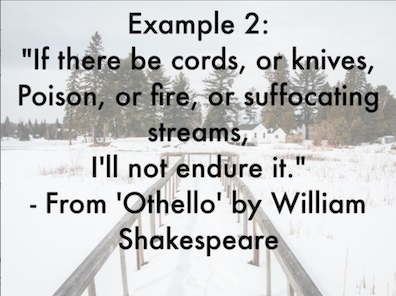Polysyndeton (POL-ee-SIN-duh-ton, from Greek poly- =
many + syndeton = bound together) is the opposite of asyndeton.
Instead of eliminating the expected conjunctions from a list
or a series of clauses, it adds extra ones. So, rather than
using "and," "or," or "nor" only between the penultimate and
final items in such a series, or putting "either" or "neither"
only at the beginning, polysyndeton sprinkles conjunctions
throughout. As Gideon Burton (rhetoric.byu.edu) notes, this
often leads to "slowing the tempo or rhythm." John
Smith observes that it lends "weightinesse" to words in
a list.
Henry
Peacham cites multiples of "and" like this one: "He was
both an enemie to his countrey, and a traitor to his Prince,
and a contemner of lawes, and a subverter of cities." In
Paul's letter to the Romans Peacham finds the word "neither"
reiterated: "For I am sure that neither death, neither life,
neither things to come, neither height, neither depth, neither
any other creature shall be able to separate us from the love
of God" (8:38-39). (In the King James translation of these
verses, the word "nor" replaces all but the first use of
"neither." The effect is the same.) The motto associated with
the U.S. Postal Service repeats the word "nor": "Neither snow
nor rain nor heat nor gloom of night stays these couriers from
the swift completion of their appointed rounds."
Literary examples abound, few of them more striking than
these sentences from Ernest Hemingway's "After the Storm"
cited by Burton: "I said, 'Who killed him?' and he said, 'I
don't know who killed him but he's dead all right,' and it was
dark and there was water standing in the street and no lights
and windows broke and boats all up in the town and trees blown
down and everything all blown and I got a skiff and went out
and found my boat where I had her inside Mango Key and she was
all right only she was full of water."
Bloom's polysyndeton represents his imperfect attempt to
recall the elements of a cumulative song: "the angel of death
that slew the slaughterer that killed the ox that drank the
water that quenched the fire that burned the stick that beat
the dog that bit the cat that ate the kid that father bought
for two zuzim." In Finnegans Wake Joyce deploys a
similar figure in which the nouns are left recognizable but
the conjunctions ceaselessly mutate, never quite saying "and":
"They lived und laughed ant loved end left" (18).


